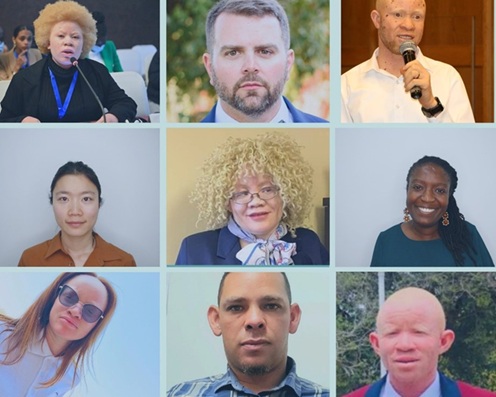(Prelims: Current Events)
(Mains, GS Paper-2: Issues relating to development and management of Social Sector/Services related to Health, Education, Human Resources) |
Context
The World Health Organization (WHO) has included sunscreen in its Model List of Essential Medicines. This decision is considered a major relief, especially for people with albinism living in Africa and other sunny regions.

About Albinism
- Albinism is a genetic condition characterized by a deficiency of the pigment melanin in the body.
- Due to the lack of melanin, the skin, hair, and eyes of an affected person are very light in color.
- Globally, it is estimated to affect 1 in 20,000 people.
- It is a congenital condition and can occur in any gender, race, or region.
Types
- Oculocutaneous albinism (OCA): It affects the skin, hair, and eyes.
- Ocular albinism: It affects only the eyes.
Characteristics
- Very light skin and hair color
- Photophobia (sensitivity to light)
- Increased susceptibility to sunburn and skin damage from the sun
- Higher risk of skin cancer
Global Prevalence
- The average rate of albinism worldwide is 1 in 20,000 births.
- However, in sub-Saharan Africa, the rate ranges from 1 in 5,000 to 1 in 15,000 births.
- In Tanzania, the rate is even higher, at approximately 1 in 1,400 births.
- Due to the high levels of sunlight in Africa, up to 90% of people with this condition may develop skin cancer before the age of 30.
- In Africa, people with albinism face social discrimination and, in some cases, violence and even murder due to superstition.
Situation in India
- Precise data on albinism in India is not available, but experts estimate that approximately 1 to 2 lakh people are affected in the country.
- The prevalence rate is similar to the global average, which is about 1 in 17,000 to 20,000.
- The main challenges are social discrimination and lack of awareness.
- Easy access to sunscreen and eye protection through healthcare services remains a challenge.
WHO's Recent Initiative
- The WHO has reclassified sunscreen from a cosmetic product to an 'essential medicine'.
- This aims to protect people who are particularly vulnerable to sun exposure, especially those with albinism.
- Governments worldwide use the WHO's list to prioritize medicines at the national level.
Benefits of this Initiative
- People with albinism will have access to free or affordable sunscreen.
- The risk of skin cancer will decrease.
- Life expectancy will increase, and quality of life will improve.
- This decision will promote health equity.
Response in East Africa
- Albinism communities in Kenya, Uganda, and Tanzania have welcomed the WHO decision.
- Tanzania has called it a significant step towards health justice.
- Local organizations have termed it a 'life-changing decision' and urged their governments to include it in their national essential medicines lists.
Challenges
- Ensuring the availability and distribution of sunscreen in rural areas of Africa and Asia
- Combating social discrimination and misconceptions
- Addressing the lack of awareness, which often leads to delays in seeking treatment and adopting preventive measures
- The difficulty for economically disadvantaged communities to afford regular sunscreen
Way Forward
- India and other countries should incorporate the WHO recommendation into their national policies
- Free distribution of sunscreen at primary healthcare centers
- Awareness campaigns on albinism to reduce social discrimination
- Dedicated programs for the early detection and treatment of skin cancer
- Facilitating global collaboration to make sunscreen production and distribution affordable and accessible worldwide



